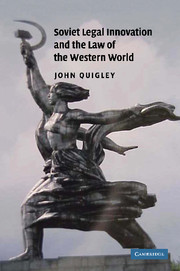Book contents
- Frontmatter
- Contents
- Abbreviations
- Preface
- Acknowledgments
- PART ONE THE SOVIET CHALLENGE
- 1 The Industrial Revolution and the Law
- 2 Economic Needs as Legal Rights
- 3 Equality in the Family
- 4 Children and the Law
- 5 Crime without Punishment
- 6 A Call to “Struggling People”
- 7 The Withering Away of Law
- PART TWO THE WEST ACCOMMODATES
- PART THREE THE BOURGEOIS INTERNATIONAL ORDER
- PART FOUR LAW BEYOND THE COLD WAR
- Notes
- Bibliography
- Index
3 - Equality in the Family
Published online by Cambridge University Press: 27 July 2009
- Frontmatter
- Contents
- Abbreviations
- Preface
- Acknowledgments
- PART ONE THE SOVIET CHALLENGE
- 1 The Industrial Revolution and the Law
- 2 Economic Needs as Legal Rights
- 3 Equality in the Family
- 4 Children and the Law
- 5 Crime without Punishment
- 6 A Call to “Struggling People”
- 7 The Withering Away of Law
- PART TWO THE WEST ACCOMMODATES
- PART THREE THE BOURGEOIS INTERNATIONAL ORDER
- PART FOUR LAW BEYOND THE COLD WAR
- Notes
- Bibliography
- Index
Summary
Even beyond the labor arena, a key bolshevik issue was the rights of women. All through the period leading up to the 1917 revolution, the party criticized Russia and the West for keeping women in a status of legal inferiority. When the Bolsheviks assumed power, women's equality was one of the first issues addressed, by reforms in domestic relations law. The Soviet approach broke sharply with Western law.
Western Law on Status of Spouses
Max Rheinstein, a scholar of European law, described nineteenth century family relations as “patriarchal in structure.” The husband-father was “the undisputed head; he was the ruler who governed his small realm just as the King of France, after the restoration of the Bourbons, governed his large one. The householder's subjects were his wife, his children, and his servants, domestics as well as farmhands or the craftsman's apprentices and journeymen, who often enough lived in the master's house as members of the household.” Wife beating was tacitly permitted. In English common law, a husband enjoyed the right of “chastisement” over his wife, which allowed him to beat her.
In Europe at the time, the husband was accorded a role of predominance in the marital relationship. In Swedish law, a woman was considered to be under her husband's guardianship. Under English common law, as was followed at the time in both Canada and the United States, the husband was head of the household and the legal representative of the wife.
- Type
- Chapter
- Information
- Soviet Legal Innovation and the Law of the Western World , pp. 17 - 26Publisher: Cambridge University PressPrint publication year: 2007



